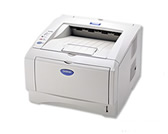HL-5070N
FAQs & Troubleshooting |

HL-5070N
Date: 10/16/2006 ID: faq00002113_000
Using the PING command to troubleshoot problems.
If you have assigned an IP address to the printer but you are unable to print or communicate with it using a web browser, the PING command may help you to troubleshoot TCP/IP network problems.
The PING command sends simple TCP/IP data to the device that you are attempting to communicate with, once the data is sent, it listens for a reply back. If the device is configured correctly, it should answer back, however, if the PING command does not get an answer back, there is a good chance that you have configured your print server in-correctly.
To use the PING command do the following:
PING ip_address
Where IP address is the IP address of the device you wish to test.
For example:
PING 10.2.65.100
If the IP configuration is correct, you will see something like this:
Reply from 10.2.65.100: bytes=32 time=2ms TTL=60 Reply from 10.2.65.100: bytes=32 time<10ms TTL=60 Reply from 10.2.65.100: bytes=32 time<10ms TTL=60 Reply from 10.2.65.100: bytes=32 time<10ms TTL=60 Ping statistics for 10.2.65.100: Packets: Sent = 4, Received = 4, Lost = 0 (0% loss), Approximate round trip times in milli-seconds: Minimum = 0ms, Maximum = 2ms, Average = 0ms |
From this we can see that we have had a reply from the device (10.2.65.100). This indicates that the print server you are trying to communicate with is configured correctly.
However, if the IP configuration is incorrect, you will see something like this:
Request timed out. Request timed out. Request timed out. Request timed out. Ping statistics for 10.2.65.123: Packets: Sent = 4, Received = 0, Lost = 4 (100% loss), Approximate round trip times in milli-seconds: Minimum = 0ms, Maximum = 0ms, Average = 0ms |
In this instance we need to check the IP address configuration of the device that we are trying to communicate with. More specifically there are typically five things you should check:
- You did not specify the correct IP address.
Check that the IP address that you specified matched the IP address of the device you are trying to commicate with.
- You have not specified the correct subnet mask for the device that you are trying to commucate with.
Check that the subnet mask setting of your computer matches the subnet mask of the device you are trying to communicate with. A typical subnet mask would be '255.255.0.0' or '255.255.255.0'
- The device may require a power cycle.
Try switching the device off and then back on again. The device that you are trying to communicate with may require to be switched off and then on again before the IP address you set is accepted.
- There is a problem with the cabling.
There is a possibility that there is a problem with the cabling, if there is another device on the same segment of cabling that uses TCP/IP. See if you can communicate with that device using the PING command. If you can, then it is a card related problem, if you can't, there is a good possibility that there is something wrong with your cabling.
- The device that we are attempting to communicate with is on the other end of a router/gateway.
If the device is not physically attached to the segment of cabling that you are using, check to see if you have to specify a gateway address.
HL-1230, HL-1240, HL-1250, HL-1270N, HL-1435, HL-1440, HL-1450, HL-1470N, HL-2460, HL-3450CN, HL-5040, HL-5050, HL-5070N, HL-7050, HL-7050N
Do you need any further assistance?
Content Feedback
Please note this form is used for feedback only.